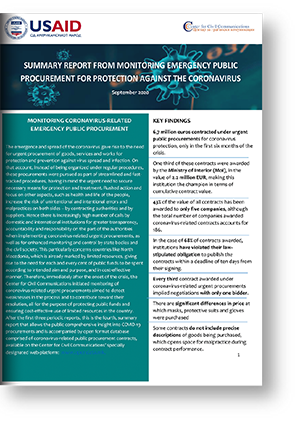The emergence and spread of the coronavirus gave rise to the need for urgent procurement of goods, services and works for protection and prevention against virus spread and infection. On that account, instead of being organized under regular procedures, these procurements were pursued as part of streamlined and fasttracked procedures, having in mind the urgent need to secure necessary means for protection and treatment. Rushed action and focus on other aspects, such as health and life of the people, increase the risk of unintentional and intentional errors and malpractices on both sides – by contracting authorities and by suppliers. Hence there is increasingly high number of calls by domestic and international institutions for greater transparency, accountability and responsibility on the part of the authorities when implementing coronavirus-related urgent procurements, as well as for enhanced monitoring and control by state bodies and the civil society. This particularly concerns countries like North Macedonia, which is already marked by limited resources, giving rise to the need for each and every cent of public funds to be spent according to intended aim and purpose, and in cost-effective manner. Therefore, immediately after the onset of the crisis, the Center for Civil Communications initiated monitoring of coronavirus-related urgent procurements aimed to detect weaknesses in the process and to contribute toward their resolution, all for the purpose of protecting public funds and ensuring cost-effective use of limited resources in the country. After the first three periodic reports, this is the fourth, summary report that allows the public comprehensive insight into COVID-19 procurements and is accompanied by open format database comprised of coronavirus-related public procurement contracts, available on the Center for Civil Communications’ specially designated web-platform: www.opendata.mk.

